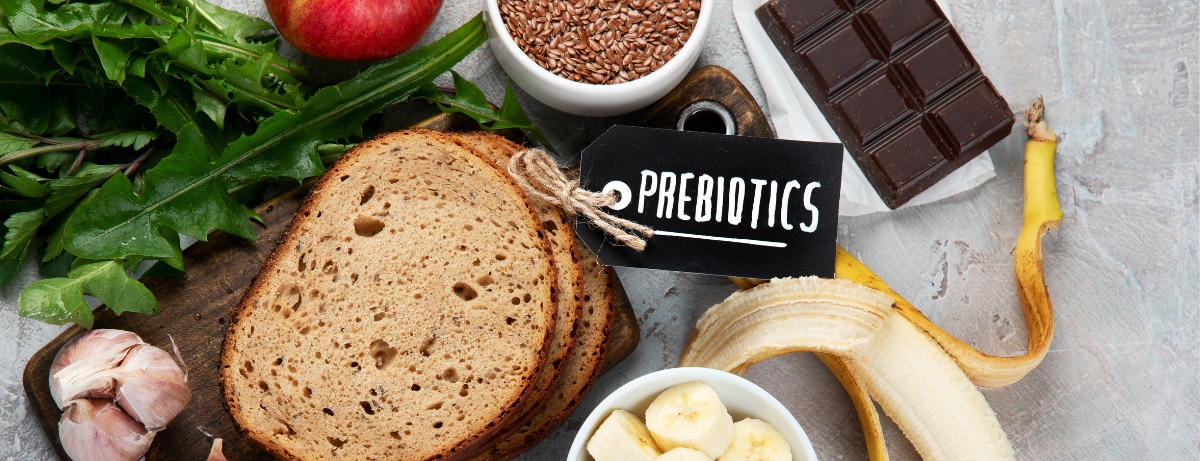20% off €35
Code:EXTRA20
Why am I so bloated?

Trying to get to the bottom of your bloating problem? Here's what's possibly causing your bloated stomach and how you can get rid of bloating.
Feeling uncomfortable? Living in elasticated waistbands? Find out how you could banish the bloat
Most of us have experienced a bloated stomach at some point – that gassy feeling after eating or drinking, making your stomach look distended and your clothes too tight! Bloating is one of the most common digestive issues, affecting 30% of people.1 But what’s causing your digestive discomfort?
What causes bloating?
There could be a number of triggers behind your bloated stomach:
1. Something you ate
Certain high-fibre foods are more likely to ferment in the gut than others and the gas produced can get stuck, giving you trapped wind. These include:2,3
- brassica vegetables, like cauliflower, kale, cabbage and broccoli
- beans and pulses
- onions
- artificial sweeteners
If you think one or more of these foods is leaving you feeling bloated, it’s important to cut down how often you eat them, but make sure you’re still getting five portions of fruit and veg a day.4
The good news is you don’t need to avoid these foods for long: re-introduce them slowly to help your body get used to them, increasing your portion size gradually.5
Another tip: drain and rinse tinned beans and pulses before using, or soak and rinse the dried variety. This lowers the amount of indigestible sugars in them, making it easier on your tummy.6
2. A problem with your digestion
Bloating may signal an imbalance in the number of friendly bacteria that live in your gut. This can occur after a tummy bug or taking some medications.7,8
Try topping up the variety and number of friendly bacteria that live in your gut. A 2010 study review, published in the journal Gut, found that taking a supplement of friendly bacteria can help irritable bowel syndrome symptoms, like bloating and flatulence.9,10
Constipation can also make you feel bloated.11 Get your bowels working more regularly by being more active every day, and raising your fibre and fluid intake.12
3. Eating too fast or mindlessly
If you bolt down your food, eat on the hop or are distracted during your meal, chances are you can swallow too much air.13
This extra air sits in your stomach until you get rid of it, either through burping or flatulence.14 Fizzy drinks and chewing gum can also make you swallow excess air, causing bloating.15
But eating too fast may also mean you over-eat, a common cause of bloating.16 In a 2011 study, researchers at the University of Bristol found that playing computer games during lunch made participants less aware of what they were eating, and they later tucked into more biscuits than the control group.17
Aim to sit down for every meal, and chew thoroughly with your mouth closed. This will help you eat more mindfully and avoid taking in excess air.18 Swapping fizzy drinks for water or peppermint tea can also help tackle bloating.
4. Food intolerance
If your symptoms start a few hours after a meal, you could be intolerant to something you ate. Common culprits include wheat, rye, barley, dairy (or lactose) and caffeine.
An intolerance can mean your bowel doesn’t empty properly, a food causes gas to become trapped, or your body produces too much gas in reaction to that food, leaving you feeling bloated.19
Talk to your GP or a dietician about keeping a detailed food and symptom diary for at least two weeks, to identify potential food or drink triggers.20
5. Irritable bowel syndrome (IBS)
People with IBS often complain of feeling bloated, especially in the evenings. That bloated feeling is often accompanied by cramps, diarrhoea or constipation. IBS is thought to be caused by food passing through the bowel too quickly or slowly, or by oversensitive nerves in the gut. Stress and certain foods can make the condition worse.21
See your GP for a proper diagnosis and to rule out other conditions. They can prescribe medications to ease symptoms, help you identify triggers and may suggest a low FODMAP diet, which avoids foods not easily broken down in the gut.22
6. Fluctuating hormones
Yes, your hormones can be to blame for your bloating – increased oestrogen levels triggering water retention, which leads to a swollen stomach.23
Being premenstrual, pregnant or menopausal can also slow digestion and affect your appetite, making you more susceptible to IBS and bloating.24,25
Stay active and well hydrated to counteract a sluggish bowel.26 For PMS or perimenopause, the hormone-balancing herb agnus castus may help.27
7. Stress
Stress can lower the sensitivity threshold of the gut. The fight or flight process diverts blood away from the gut and into the muscles, so digestion suffers – as may our food choices and eating habits. It’s also known to worsen IBS.28
Reduce stress with a healthy diet and exercise, yoga and meditation. Adaptogenic herbs, such as rhodiola, ginseng and ashwagandha, may help the body cope better under stress.29
When to see your doctor
It’s rare, but bloating can be a symptom of a serious condition, so see your GP if you have persistent bloating and a feeling of fullness.30
Advice is for information only and should not replace medical care. Please check with your GP before trying any remedies.
- Agrawal A and Whorwell PJ. Review article: abdominal bloating and distension in functional gastrointestinal disorders – epidemiology and exploration of possible mechanisms. Available from: https://onlinelibrary.wiley.com/doi/full/10.1111/j.1365-2036.2007.03549.x
- NHS Choices. Beat the bloat. Available from: https://www.nhs.uk/live-well/eat-well/remedies-for-bloating-and-wind/
- Washington Post. How to beat the bloat (aka food baby). Available from: https://www.washingtonpost.com/lifestyle/wellness/how-to-beat-the-bloat/2016/06/13/0addba5a-2ce9-11e6-9b37-42985f6a265c_story.html?utm_term=.bf907dc47419
- NHS Choices. Beat the bloat. Available from: https://www.nhs.uk/live-well/eat-well/remedies-for-bloating-and-wind/
- Washington Post. How to beat the bloat (aka food baby). Available from: https://www.washingtonpost.com/lifestyle/wellness/how-to-beat-the-bloat/2016/06/13/0addba5a-2ce9-11e6-9b37-42985f6a265c_story.html?utm_term=.bf907dc47419
- NHS Choices. Beans and pulses in your diet. Available from: https://www.nhs.uk/live-well/eat-well/beans-and-pulses-nutrition/
- Lacy BE, et al. Pathophysiology, Evaluation and Treatment of Bloating. Available from: https://www.ncbi.nlm.nih.gov/pmc/articles/PMC3264926/
- NHS Choices. Probiotics. Available from: https://www.nhs.uk/conditions/probiotics/
- Moayyedi P, et al. The efficacy of probiotics in the treatment of irritable bowel syndrome: a systematic review. Available from: https://www.ncbi.nlm.nih.gov/pubmed/19091823
- NHS Choices. Probiotics. Available from: https://www.nhs.uk/conditions/probiotics/
- NHS Choices. Beat the bloat. Available from: https://www.nhs.uk/live-well/eat-well/remedies-for-bloating-and-wind/
- NHS Choices. Beat the bloat. Available from: https://www.nhs.uk/live-well/eat-well/remedies-for-bloating-and-wind/
- NHS Choices. Beat the bloat. Available from: https://www.nhs.uk/live-well/eat-well/remedies-for-bloating-and-wind/
- Lacy BE, et al. Pathophysiology, Evaluation and Treatment of Bloating. Available from: https://www.ncbi.nlm.nih.gov/pmc/articles/PMC3264926/
- NHS Choices. Beat the bloat. Available from: https://www.nhs.uk/live-well/eat-well/remedies-for-bloating-and-wind/
- WebMD. Bloating 101: Why You Feel Bloated. Available from: https://www.webmd.com/digestive-disorders/features/bloated-bloating#1
- Oldham-Cooper RE, et al. Playing a computer game during lunch affects fullness, memory for lunch, and later snack intake. Available from: https://academic.oup.com/ajcn/article/93/2/308/4597636
- NHS Choices. Beat the bloat. Available from: https://www.nhs.uk/live-well/eat-well/remedies-for-bloating-and-wind/
- NHS Choices. Food intolerance. Available from: https://www.nhs.uk/conditions/food-intolerance/
- NHS Choices. Food intolerance. Available from: https://www.nhs.uk/conditions/food-intolerance/
- NHS Choices. Irritable bowel syndrome (IBS). Available from: https://www.nhs.uk/conditions/irritable-bowel-syndrome-ibs/
- NHS Choices. Irritable bowel syndrome (IBS). Available from: https://www.nhs.uk/conditions/irritable-bowel-syndrome-ibs/
- Medical News Today. Cause and treatment for menopause bloating. Available from: https://www.medicalnewstoday.com/articles/319609.php
- Hirschberg AL. Sex hormones, appetite and eating behaviour in women. Available from: https://www.ncbi.nlm.nih.gov/pubmed/22281161
- WebMD. Do your hormones affect IBS? Available from: https://www.webmd.com/ibs/guide/hormones-ibs#1
- Harvard Medical School. Rethinking fiber and hydration can lead to better colon health. Available from: https://www.health.harvard.edu/diseases-and-conditions/rethinking-fiber-and-hydration-can-lead-to-better-colon-health
- Schellenberg R. Treatment for the premenstrual syndrome with agnus castus fruit extract: prospective, randomised, placebo controlled study. Available from: https://www.bmj.com/content/322/7279/134
- Foster J et al. Stress & the gut-brain axis: Regulation by the microbiome. Available from: https://www.sciencedirect.com/science/article/pii/S2352289516300509
- Panossian A and Wikman G. Effects of Adaptogens on the Central Nervous System and the Molecular Mechanisms Associated with Their Stress—Protective Activity. Available from: https://www.ncbi.nlm.nih.gov/pmc/articles/PMC3991026/
- NHS Choices. Ovarian cancer. Symptoms. Available from: https://www.nhs.uk/conditions/ovarian-cancer/symptoms/



